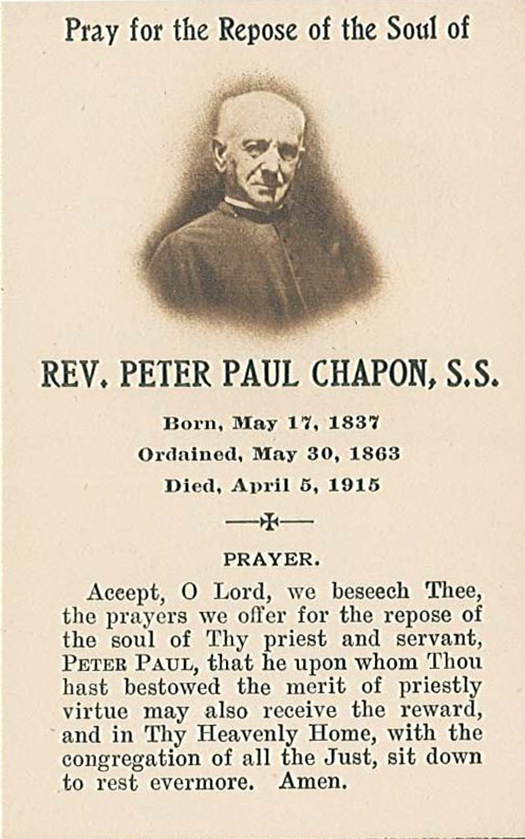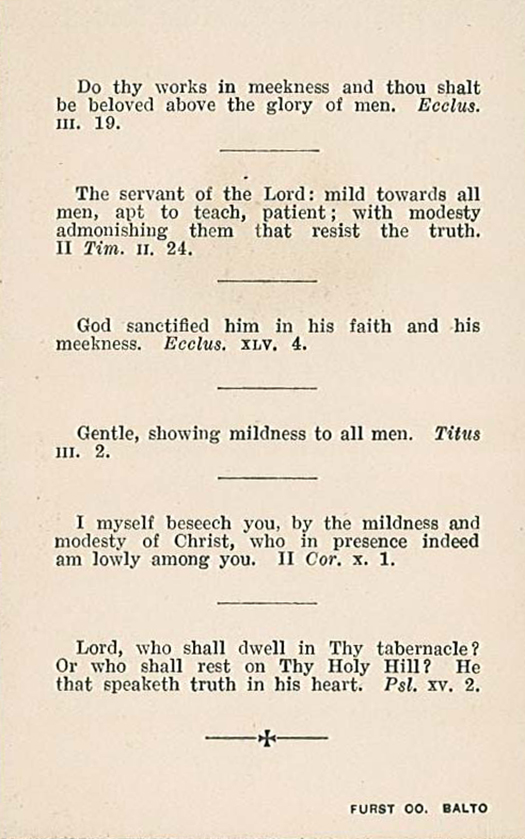Chapon, Father Pierre
1915, April 5
Date of Birth: 1837, May 17
Paris
August 4, 1915
In the United States in the course of the school-year 1914-1915, four of our confreres engaged in our work have died: Fathers Schwalbach, Berkeley, Chapon, Dumont. I have been unable up to now to express the traditional tribute of our remembrance. But even late, that tribute remains due, and I herein pay it to them for your edification and as a duty of piety towards those who belong to our family.
† † †
Father Pierre Paul Chapon was born in the little town of Cours (Rhône) in the Diocese of Lyon on May 17, 1837. He made his early studies at the boarding school of the Brothers of Charlieu (Loire) and he always kept a fine memory of it. He liked to recall the great edification which he had received from a venerable Marist Father, chaplain of the house, who often spent eight hours a day before the Blessed Sacrament. Later at Boston before the Investigatory Tribunal he was happy to give as a witness evidence in the canonical process for the beautification of the holy religious. Perhaps he had dreamed of becoming a Marist. At least, for the priests of that congregation he always kept a lively admiration and a deep devotion.
From the boarding school he went to the minor seminary of St. Jodard (Loire), where he spent about three years – always at the head of his class. He filled there the role of choir master, a preparation for a like role given him during long years at Baltimore and Boston until a throat illness made singing impossible for him. For him it was a real privation not to be able to take the accustomed part in the church services and not to be able to sing High Mass in his turn. He liked to live over his years at St. Jodard. Though away from it, he was glad to support it and to help with his mite the rebuilding of that flourishing little seminary towards 1896. He was to suffer deeply some years later on learning of the confiscation of that house built exclusively with Catholic funds.
At Alix, the seminary of Philosophy of the Diocese of Lyon, he acquired a strong taste for the study of Philosophy, doubtless because the dominant qualities of his mind – reflection and deep thought – were better suited to Philosophy than to any other subject. He studied Theology at the Seminary of St. Iraneus. The notion of Sulpician vocation came to him when the Superior of the Baltimore seminary visited Lyon. He volunteered to be a Sulpician and to go to work in the United States. His offer was accepted, and, after the ordinary period of trial, he was on his way to Baltimore. His views were modest: “I was at least capable of being a bit of a teacher at St. Charles College.” He was appointed to the major seminary, St. Mary’s. There he worked for more than twenty years. On the opening of St. John’s Seminary in Boston, Father Hogan was happy to have Father Chapon as co-worker. He left behind at Baltimore a reputation for knowledge. He acquired the same reputation in his new post.
He taught Moral [Theology]. It was not by choice, for he had often affirmed his preference for Dogma and Philosophy. But the thought of duty was enough to bind him to the subject assigned; and the application of his vigorous mind, reflective and clear, guaranteed him exceptional competence. He was slow in giving solutions [to moral cases], but because they were known to be well thought out, they were accepted with full confidence. Too, he had a very delicate and unyielding Catholic sense. He very well knew how to recognize and defend the truth. Modernism, a subtle and involuted error, was particularly obnoxious.
But more than for displaying knowledge, he was at Boston revered for holiness and goodness. It was said: he is a saint; his mere presence is a blessing. The Boston house had that blessing for twenty-one years. Numerous are the tributes coming from the New England priest-alumni who knew and admired him. He was a man of good counsel, a community man, a man of sure conscience, and always a man of obedience and exemplary charity. “What an inspiration for us,” said a young seminarian, “seeing him at his age always the first to respond to the sound of the bell, and careful to do all that the rule required.” He could not imagine that anyone fail to put into practice Gospel principles; and his speech – for one so good – had sometimes a severe frankness when he saw them overlooked. May we record here the tribute paid him at his funeral by Bishop Walsh of Portland.
“He was a noble son of Catholic France. Born in the Diocese of Lyon, he brought to us some of the great virtues of that French province. At Lyon, better than in any other large city of France, can be seen in the churches and amidst the people fervent signs of the faith. From the gospel seed exposed to the sun has grown a great tree whose branches extend to the most distant countries The Society of the Propagation of the Faith. Very near is beautiful Savoy, evangelized and made holy by St. Francis de Sales, who in the See of Annecy by his knowledge and virtue revealed and personified ‘the strength of sweetness.’ Not far from Lyon lies the village of Ars whose pastor, not long ago, sanctified all the surrounding countryside by the humility and simplicity which glowed from his person as well as from his house and his little church.
“In the course of a pilgrimage which I made to these three places five years ago, and seeing how much these virtues showed themselves there to the eyes of a traveler who was only passing through, I said to myself that of all the priests who have come from France, the one who seemed to me to best personify these sublime gifts and who had brought them as a precious heritage to our country was Father Chapon, who had received his life and his education near these blest places. That thought comes back to me today with much force, and it gives me a still more vivid idea of where his deep faith, his sweetness, wherein lay the force, the humility, and the simplicity of his character and his manner.
“When it was a question of the development in class of a theological thesis, or of a plan for social or religious apostolate, or even of the appreciation of the character or worth of a person or an organization, he always had that oculus simplex [unclouded eye] which was a light for his whole being.
“As with his sharp ear and his exact knowledge of plain chant and church music no false note escaped him, and he allowed his distress to appear on his face, so also when he came across a false note in doctrine, in history, and especially in matters spiritual, he immediately cried out: ‘But, sir, that is not true!’ Such was his simple criterion. He had an equal hatred for fakery and for a false display of virtue, especially when it was a question of priestly vocation. And if ever a just indignation made his eyes flame it was when he set in striking contrast to the lessons and example of a St. Charles the unworthy representatives of the Church in the sixteenth century.”
A telling fact suffices to show what self-denial he practiced. Three successive superiors of St. John’s Seminary – Fathers Rex, Maher, and Havey – had been his students at Baltimore or at Boston, and he gave to each of them the same unselfish devotion that he gave to the Superior General.
After a twenty-five year stay in Boston, Father Chapon returned to St. Mary’s in Baltimore. Our confrere was happy about returning to the field of his first apostolate. There he taught. There were days of joy and celebration. The finest of those days was that of his priestly golden jubilee, June 14, 1913. Father Chapon saw come to him his old students: many priests, seven or eight bishops, who told him of their gratitude, their joy over his good health, their prayers for his long life. He listened to praise from his confreres, in whoe name Father Dyer declared that his life had added to the debt of gratitude which the American Church was under obligation to pay back to France. And that was very sweet to his heart. He loved the work in the United States. He loved the work more and more. As long as he could, he worked for the Church; and when he could not work, he prayed and merited for her. So, always mild and good, he went towards his end, towards death; in his last days he was having a clearer and clearer view of it as it neared. He did not know the day nor the hour. But he knew it was near – he was waiting. It came; and as it comes for so many good servants of God, it was without violent shock or surprise.
On Palm Sunday, he attended the long ceremonies at the Cathedral without becoming overtired. He intended to participate all week as he had for more than fifty years. But the following Wednesday, after Mass, he found himself in distress. He did not hold class and he had to take to his bed. He was suffering from pneumonia, which kept getting worse. On Easter Sunday the doctor advised giving him the last sacraments. Before the High Mass he received them with full presence of mind, with devotion and resignation. He answered all the prayers and expressed his thanks for all that was being done for him. Dying did not seem hard. “It is nothing,” he said several times. For him it was the last exercise of a life always most regular, the last call of the Master’s voice. After evening prayers, the prayers for the dying were said. He joined in with complete understanding and piety. When the time came to leave him, he spoke again with a great deal of good spirit, and he smiled the good smile which in him was so attractive.
A little after midnight Holy Communion was brought to him, and he received It with much devotion. About an hour and a half later, he stopped speaking. It was the agony. The final moment was approaching. In te, Domine, speravi, non confundar in aeternum [In Thee, O Lord, I have hoped; let me not be confounded], Father Dyer said to him; and a few moments later, without agitation, mild even close to death, he rendered his beautiful soul to God. It was Easter Monday, April 5th.
The following Wednesday, April 7th, the funeral took place in the Baltimore Cathedral. Six bishops, twelve dignitaries, and several hundred priests came to join two hundred seminarians to pay their last respects to the revered deceased. Bishop Louis Walsh of Portland preached the eulogy. His Eminence, Cardinal Gibbons, consented to give the absolution, and Bishop J. J. Rice of Burlington recited the prayers at the grave of the dear departed in the little cemetery where the Baltimore Sulpicians lie.
† † †
I recommend to your prayers the four deceased American confreres: Fathers Schwalbach, Berkeley, Chapon, and Dumont. I renew to you the expression of my very devoted sentiments in Our Lord.
H. Garriguet
Superior of St. Sulpice


